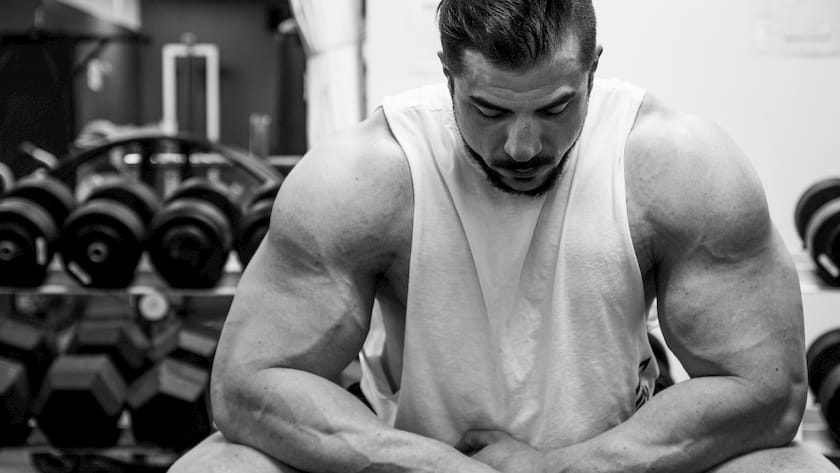Is eating carbs at night going to make you gain fat? This seems to be an age-old question of gym-goers who crave sugary treats before bed. But is there any truth to the idea that carbohydrates are more likely to be stored as body fat if you eat them before going to sleep?
At one point or another, we’ve all eaten a gluttonous amount of food and felt extremely tired shortly after. A classic example of this is when you hear people say that their Thanksgiving dinner is putting them to sleep. Surprisingly though, the turkey has very little to do with that tiredness: it’s the carbs that are making people sleepy.
In this article, we will examine what causes this phenomenon, and why eating carbs at night might be better for you than traditional health “gurus” would have you believe.
What Causes Post-Eating Tiredness?
Some people may be familiar with the term “carb coma,” which is essentially the physiological basis for why people may feel sleepy after eating. Eating carbs tends to increase the activity of a “calming” chemical in the brain called serotonin.
Serotonin is made in the pineal gland of the human brain, and while it may follow several metabolic pathways, it is often converted to the sleep-promoting hormone melatonin.
You may be familiar with a class of drugs called selective serotonin reuptake inhibitors (SSRIs). SSRIs are commonly prescribed to treat anxiety and depression since increased serotonin levels promote feelings of ease and relaxation, and may also make people drowsy.
The “Tired After Turkey” Phenomenon Explained
One commonality among most all Thanksgiving meals is the inclusion of large amounts of turkey. Soon after the “big turkey dinner,” people tend to feel quite sleepy and attribute it to the turkey breast.
These individuals are on the right track with that supposition, since turkey breast is a protein source rich in the amino acid L-tryptophan.
Lo and behold, since neurotransmitters are often proteins (chemically speaking), L-tryptophan is the amino acid that is converted to serotonin.
We’ve shown some common foods that increase serotonin levels, and why this makes you feel drowsy. It’s not too hard to see that eating a traditional carb-laden Thanksgiving dinner with generous amounts of turkey breast will leave you wanting a nap.
How to Deal With Post-Eating Drowsiness
Note that feeling drowsy after eating isn’t necessarily a “bad” thing, nor is it abnormal (especially after large meals). However, for the instances when someone needs to be alert or awake after eating, here are a few tips to consider.
1. Caffeine
Drink a caffeinated beverage shortly after finishing your meal. The effects of caffeine should promote alertness and wakefulness in spite of your serotonin levels.
2. Go For a Walk
Just getting some sort of light physical activity can keep the body from “shutting down.” Even a short stroll around the neighborhood can help keep you alive and kickin’ after a big meal. Don’t bum around on the couch after a big meal because that will surely not make your drowsiness to go away.
3. Go Lighter on the Carbs
A study at the University of Texas found that animals fed high-protein, low-carbohydrate diets had decreased levels of serotonin compared to those that eat high-carbohydrate, low-protein diets. [1] It appears this arises from insulin mediating amino acid entry across the blood-brain barrier. Does this mean you should never eat carbs? Absolutely not. It just means you shouldn’t overeat carbs. Not to mention, there are many other detrimental effects of eating too many carbs.
Eating Carbs at Night Is to Your Benefit
As mentioned earlier, many “health experts” claim that eating carbs at night (or close to bedtime) is a bad idea. They claim this since insulin sensitivity is generally lower at night. However, this is rather baseless. Consider that there is nearly no research showing that individuals who eat carbs at night are any more likely to gain body fat than people who eat their carbs earlier in the day.
Moreover, eating some carbs at night is a great way to elevate serotonin levels and promote restful sleep. In this case, some would be anywhere between 15-25% of your total daily carb intake.
A good night’s rest is about the best thing any active individual can ask for. Not getting enough sleep is a surefire way of hindering recovery from training.
Lastly, eating carbs at night will promote recovery since carbs are protein-sparing nutrients and elevate insulin levels (which is one of the most anabolic hormones in the body). It’s no wonder people who deprive themselves of carbohydrates often don’t sleep or recover well.
Takeaway Points
Hopefully, now the whole “turkey making you tired” phenomenon makes more sense. More importantly, you should have a better grasp of why eating carbs at night is not detrimental in the context of a healthy diet. Keep in mind that tiredness after eating isn’t always a bad sign; it actually has positive results in certain circumstances.
Nevertheless, if you have things to get done but you still plan on eating a turkey lunch, then you may want to consider using the tips provided. If not, you’ll probably find yourself snoozing on the couch all afternoon instead of crushing the iron.
References
- ”Secrets of Serotonin”; Carol Hart: 2008 The University of Texas Addiction Science Research and Education Center: Dopamine—A Sample Neurotransmitter ”Nutrition & Behavior: A Multidisciplinary Approach”; John Worobey, Beverly J. Tepper and Robin Kanarek; 2006




Leave a comment
All comments are moderated before being published.
This site is protected by hCaptcha and the hCaptcha Privacy Policy and Terms of Service apply.